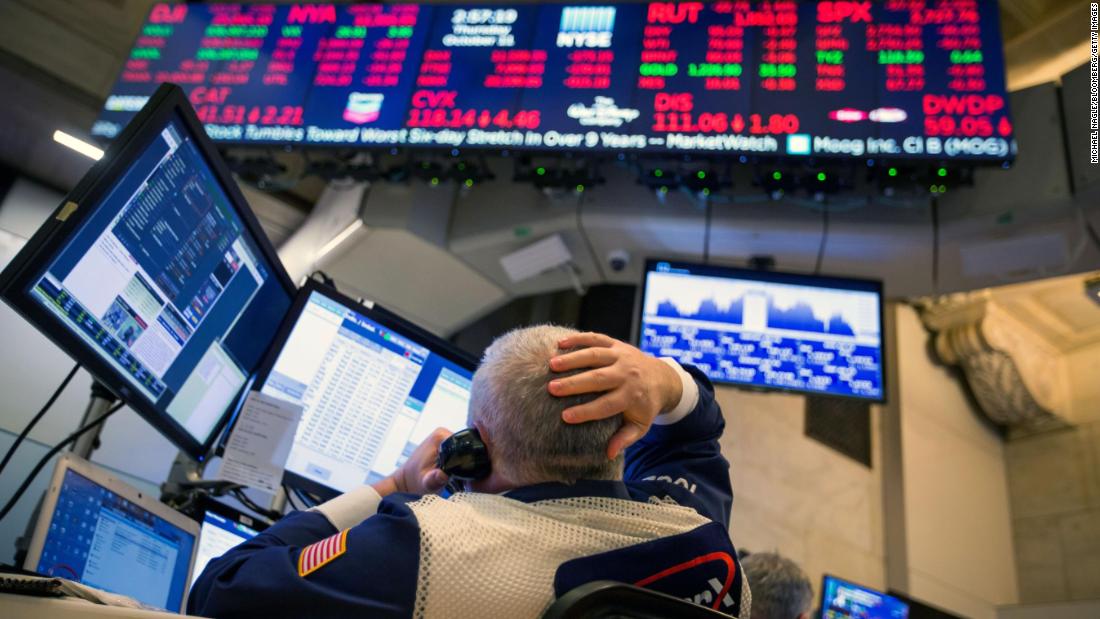
Blame the fallout from the US-China trade war. And fears of a slowdown in corporate earnings. Don't forget about jitters caused by rate spikes, Federal Reserve policy and geopolitical turbulence.
But in the end, these storylines all speak to an overarching concern: Is this as good as it gets? Are the best days of this historically long business cycle -- both for stocks and the economy -- in the rearview mirror?
Despite Thursday's sizable rebound, the S&P 500 is on track for its worst month in eight years. The market plunge reflects waning optimism about economic and profit growth. Wall Street is increasingly worried both will slow as the recovery from the Great Recession ages, the sugar rush from tax cuts fades and costs rise.
"At least for now, things are probably as good as they're going to get," said Kristina Hooper, global market strategist at Invesco.
That sudden realization has led investors to rush out of high-flying tech stocks and pile into the relative safety of utilities, cash and bonds. The Nasdaq's 2.7% rally on Thursday is only enough to recover a chunk of Wednesday's 4.4% plunge, the index's worst day since 2011. Former darlings like Netflix (NFLX), Facebook (FB) and Amazon (AMZN) have all been knocked down.
"The euphoria genie -- always a warning signal -- is back in the bottle," Greg Valliere, chief global strategist at Horizon Investments, wrote to clients on Thursday.
Recession jitters hit banks
Tech and other risky corners of the market aren't the only sectors getting crushed. Banks, which are very sensitive to swings in the economy, are in a deep slump. Big banks, known as universal banks, have declined about 15% on average since mid-September, according to Keefe, Bruyette & Woods.
That steep selloff reflects investors starting to price in a "shallow economic recession," KBW wrote in a report on Thursday. While the firm doesn't see an "imminent" recession, it warns that such a downturn could cause bank earnings to tumble by 12% in 2019 and 20% in 2020.
The market is not betting the economic expansion is over. But investors are acknowledging the growing risks posed by the US-China trade war, the Fed's interest rate hikes and inflation. The IMF set the stage on October 8 when it downgraded 2019 GDP projections for both the United States and China.
Profit warnings and dividend cuts
Corporate America added fuel to the fire, with some major companies sounding a more cautious tone about the future. Investors were unnerved on Tuesday when Post-It maker 3M (MMM) slashed its outlook and Caterpillar (CAT) issued disappointing guidance. Harley-Davidson's (HOG) US sales plunged 13%.
Although some companies like Tesla (TSLA) and Whirlpool (WHRL) have soothed investor fears, others are amplifying concerns that rising prices will eat into record-high profit margins. For instance, Sherwin-Williams (SHW) dimmed its outlook on Thursday due to higher costs.
And other companies are reminding investors about the vast amount of debt piled up during the era of low interest rates.
Debt-riddled Anheuser-Busch Inbev slashed its dividend on Thursday, and some analysts say General Electric (GE) may soon do the same to repair its balance sheet.
Wall Street may get a fresh reminder of the growth slowdown from Friday's GDP report. Economists surveyed by Refinitiv estimate that US growth slowed to 3.3% in the third quarter. While that is still impressive, it would mark a deceleration from the second quarter's 4.2% surge.
Officials at the Federal Reserve are anticipating the economy will lose further steam ahead. The Fed is calling for 2019 GDP growth of 2.5%, followed by 2% in 2020 and 1.8% in 2021.
Dialing back expectations
It's possible the warnings from Corporate America force the Fed to scale back its plans to raise interest rates several more times over the next few quarters.
There's already evidence that the Fed's rate hikes are raising borrowing costs in two industries that heavily rely on credit: autos and housing.
"The Fed may begin to take the foot off the gas pedal," Hooper said.
Then again, Fed chief Jerome Powell will not want anyone to think he is folding to political pressure from President Donald Trump, who recently called the central bank "my biggest threat." And the Fed needs to acknowledge that tariffs are inflationary.
None of this means that the bull market, already the longest in American history, is over. Yes, the bull run is starting to show signs of old age. But it doesn't need to be on its death bed.
The US economy is still cruising along better than most of its peers. And Corporate America is still making gobs of money, albeit perhaps at a slower pace going forward. Investors are coming to terms with that.
"Expectations are more realistic," said Valliere. "Some air has seeped out of the bubble, and that's a good thing."
No comments:
Post a Comment